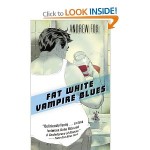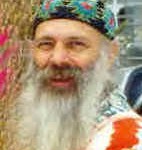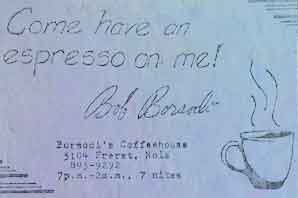Introduction:
So far, this is the only short story I’ve written that features Jules Duchon, my vampire character from Fat White Vampire Blues and Bride of the Fat White Vampire. I wrote it in the spring of 1998, not long after I’d started the first novel. It was a birthday gift for my friend Bob Borsodi, who was celebrating his sixtieth birthday. Bob owned a coffeehouse just like the one in the story. He was justly famous around New Orleans, probably the country’s most laxidasical big city, as the slowest man in town. I once saw him shoo away a big group of paying customers, a dozen sorority girls who’d come into the coffeehouse on a dare, because he didn’t want to feel hurried behind the counter. He told them to leave, then come back in groups of two or three. I think they ended up in the bar down the street.
Bob’s birthday party was held in a picnic shelter next to the Mississippi River. His musician friends played music, his poet friends read poems, and I read this story. Bob liked it, although he wasn’t quick to say so.
______________________________________________________________________
Jules Duchon was consumed with thirst. There was no denying his awful need for fresh blood. It tore at his soul and the pit of his stomach like a rabid tiger. And the poor vampire was in a double-bind, because his need for coffee was nearly as acute. Blood and coffee, coffee and blood. . . like the clashing rocks that almost did in Ulysses, these twin hungers threatened to crush him between them. His only option was to try to kill two hungers with one stone.
There was a place he knew about. A little bohemian-style coffeehouse called Breezy’s that was usually pretty empty this time of night. A big point in its favor was its disreputable neighborhood. A bomb could go off inside the coffeehouse, and Jules was certain the neighbors wouldn’t bat an eyelash — letting the whole block burn down was preferable to calling the cops. A vampire could do his business undisturbed.
He parked his freshly waxed Cadillac Fleetwood taxicab on the grassy swale along Soniat Street, next to a weed-strewn ball field across from the coffeehouse. Early ’70’s funk music echoed off the tightly-bunched shotgun houses that lined the street; not Jules’s favorite music by any means, but it beat rap all to hell. The Cadillac’s big V-8 motor, a living fossil from the days before catalytic converters and of the same vintage as the funk music, burbled like a pit bull enjoying a raw steak; it seemed almost grumpy to be shut off. Jules eased himself slowly onto the swale. He was a big man, nearly 450 pounds. He never knew when his knees might pop like Fourth of July firecrackers, so he had to be careful not to step in any ruts.
Breezy’s Coffeehouse didn’t differentiate itself from its residential neighbors with a sign, neon or otherwise. The closest it came to exterior distinction was its Christmas lights, lit year-round. Breezy’s was one of those places you simply had to know was there. Jules slowly climbed the three concrete steps that led to the entrance, opened the screen door, and stepped inside. He’d been here a few times before for a cup of coffee, whenever he’d dropped a fare in the neighborhood.
The place’s interior reminded him a little of the over-cluttered Victorian interiors of his mother’s and aunt’s houses. . . well, maybe if his mother or aunt had been tripping on LSD while they’d been decorating. Every square inch of wall and ceiling space was covered with a dense carapace of theatrical photographs, music posters, poetry leaflets, stolen street signs, and a hundred kinds of glued-on bric-a-brac.
Aside from a trickling sound of running water, the coffeehouse was quiet as the inside of a velvet-lined coffin. When Jules rounded the corner of the entrance foyer, he saw that he and the proprietor were the only two people inside. Bob, the owner, was washing dishes behind the counter. His long, white beard reminded Jules of Rip Van Winkle, or Father Time. He slowly looked up from his work and nodded almost imperceptibly at the big vampire.
Looking into Bob’s heavily-lidded eyes, Jules felt time shift and thicken, its flow changing from a rushing river to a creeping pool of tar. It was an eerie feeling, strange for Jules, who was much more used to being the one who creeped other people out.
“I’m sorry,” Bob said, the sponge in his hand circling a dinner plate with the agrarian pace of the moon’s orbit around the earth. “We’re closed.”
“But your door was still open,” Jules said. “All I want is a cup of coffee. I won’t hang around long.”
Bob looked down at his dishes again. “Can’t help you there, friend. Just dumped out what was left in the pot. We’ll open up again tomorrow night, around seven or seven-thirty or thereabouts.”
Jules stared at the ancient brass and stainless steel espresso machine behind the counter. “Could you maybe make me a cappuchino?”
Bob patted the machine like it was a dear, somewhat senile relation. “‘Fraid her fire’s been out fifteen minutes or so. It’d take a while to get steam up again.”
A terrible lust for coffee, nearly as strong as his lust for blood, shook Jules to his marrow. “Just get it started. I’ll wait.”
Jules stepped towards the counter. Too late, he noticed that he passed in front of a tarnished, antique mirror. He noticed the proprietor’s eyes slowly widen as he saw that Jules cast no reflection. But the owner’s hands never stopped their glacial, steady work of washing dishes.
The cat’s out of the bag, Jules thought. He was surprised when Bob didn’t utter a cry of dismay or make a sudden dash towards the rear entrance. Instead, the long-bearded proprietor shuffled over to the espresso machine, lovingly patted it once more, and lit the gas flame beneath its boiler.
Jules perched himself awkwardly atop one of the stools at the counter. The stool groaned ominously. “You know what I am, don’t you?” he said.
Bob stepped back to the sink, moving like ice thawing in spring. “Yessss. . . I know what you are.”
“You know this is your last night on earth?”
Bob didn’t look at him, but Jules didn’t sense that the owner was avoiding his eyes with fear. The emotional tenor of the room hasn’t changed one whit; it was still as calm as the Kansas prairie after a gentle rain. Bob picked up another mug, dunked it in soapy water, rubbed it inside and out with his sponge, dunked it in soapy water again, then rinsed it in a basin of fresh water. He dried it lovingly with a faded towel, as though he were polishing his grandmother’s silver.
“Yesss,” Bob said. “That might well be so.”
“I’m not without feelings,” Jules said. “When you make me that cappuchino, make one for yourself. We’ll have a final cup of coffee together before I drain ya.”
“Fer sure,” Bob said, as he lifted another dirty mug from the counter and began the washing process anew.
The agonizing need for his two forms of sustenance throbbed through Jules’s veins, now a full-body migraine headache. He watched the water column in the pressure gauge of the espresso machine slowly, slowly, slowly rise. It was like watching an oak tree grow. Jules wished he knew how to operate the espresso machine himself — then he could fang the owner and at least satiate his bloodlust while he was waiting for his cappuchino. But no. . . somehow, fate had strangely placed him in the hands of this too-placid victim.
He stared at the collection of knick-knacks that lined the countertop. Ceramic and plastic figurines of turtles predominated. Next to the empty coffee pot sat a shiny brass snail. Affixed to the snail’s shell was a tiny cardboard banner. Jules read the message. In carefully written ink letters, it said, “SLOW IS BEAUTIFUL.”
Jules felt dizzy. Time seemed to twist and stumble again, rolling to a halt like an ancient jalopy that had run out of gas and blown three tires all at once. Jules fearfully glanced at the espresso machine’s pressure gauge again. Even though a blue gas flame danced beneath the boiler, the water inside the gauge hadn’t moved a fraction of a millimeter since he’d last looked.
He felt himself sweating, but the sweat droplets refused to roll down his armpits. His heartbeat had slowed down. He felt faint from a lack of blood reaching his extremities. His massive form swayed precariously on the slender barstool.
The owner picked up another mug. Bob’s head turned towards Jules, his neck, the neck Jules needed to bite so badly, swiveling with all the speed of the Tin Woodsman’s before Dorothy oiled him up. The owner’s eyes bored into his, yet they held a kindly glimmer of concern.
“Every. . . thing. . . all. . . right. . ., friend?” Bob asked.
Jules didn’t know where Bob’s power came from. But he sure knew when he was beaten.
“All right! All right, already!” the vampire cried in dismay. “I’ll go to fuckin’ Starbucks!” He slid off the stool and retreated out the door as fast as his overburdened legs would carry him.
_________________________________________________________________________________




Hi Andy,
Thanks for telling me about your website. This “Jules Versus Breezy” story is terrific! Strange that I have no memory of reading it. Surely I must have? So it came fresh and funny as your stuff always does the first time for me, mellowing on the second and third reading.
And the article on Bob and why he meant so much to you was great as well. I remember your talking about him and introducing me to him and the coffeehouse, but this is the most detail I’ve seen on just how close you were and how much he had connected you to NOLA.
All this made me sad for missing him and all we’ve lost in NOLA, you and Dara and the family being one of the biggest. How do these things happen? Why do the good things change so often? Well, I guess the bad do too: “This too shall pass.”
I think I’ll reread _The_Good_Humor_Man_. That will make me feel better.
With so many fond memories,
Fritz
Hey, Fritz! Thanks for coming around to visit. I’m glad you enjoyed the story. I remember how you used to enjoy going with me to Borsodi’s. See you in early November, I hope, when I come down for CONtraflow on the West Bank.